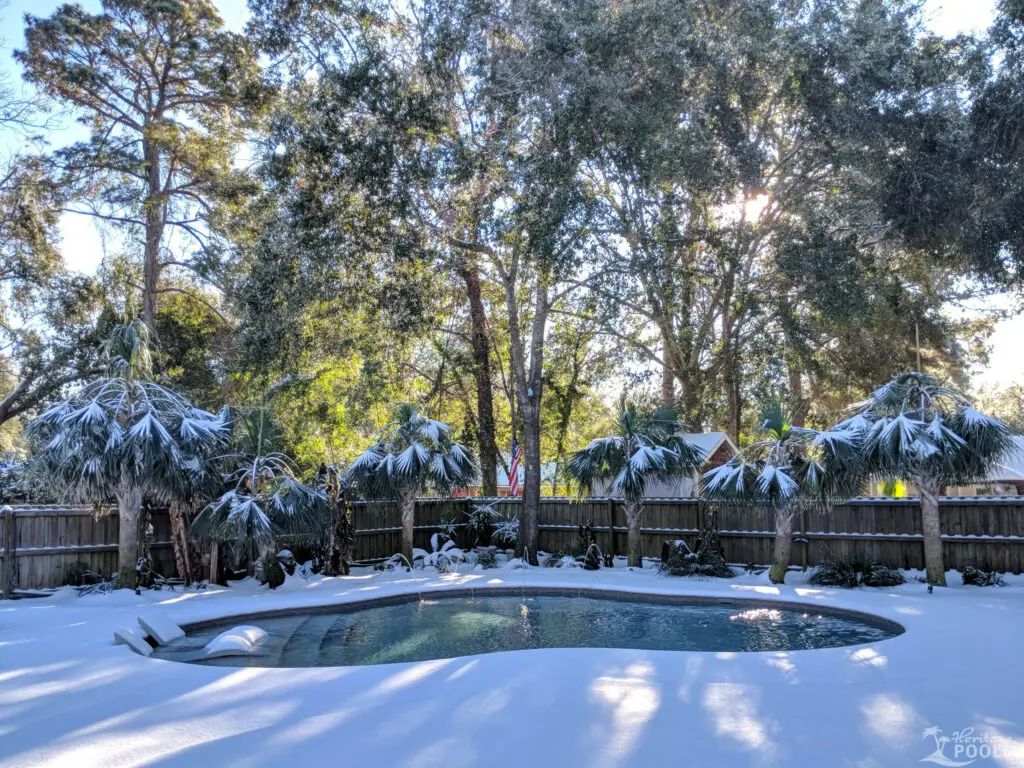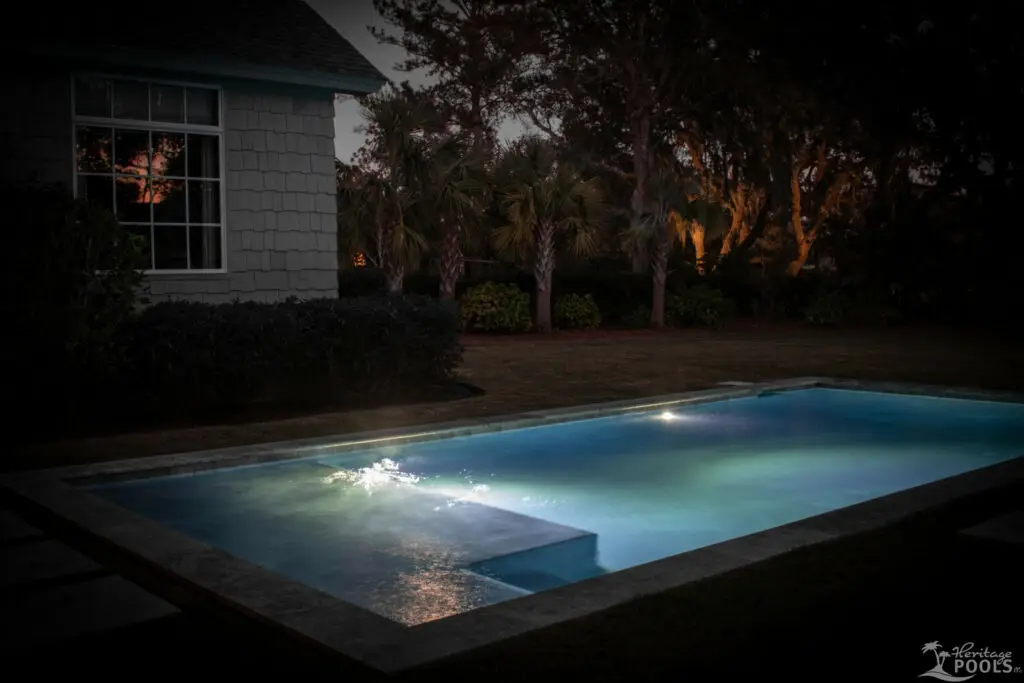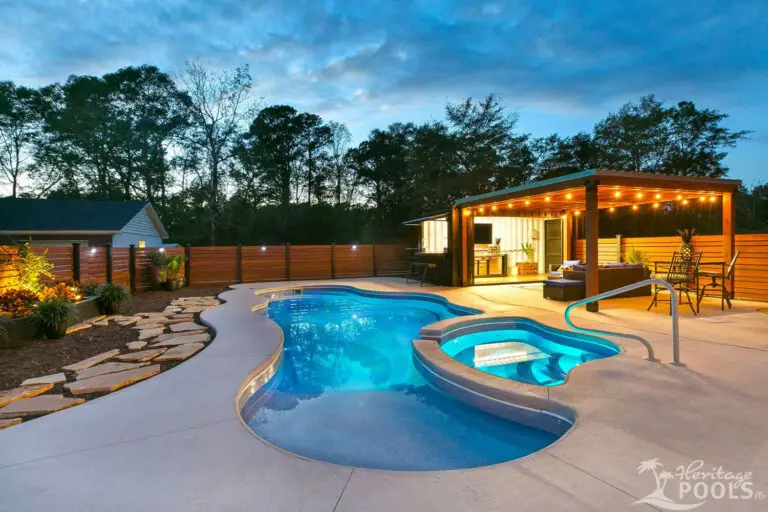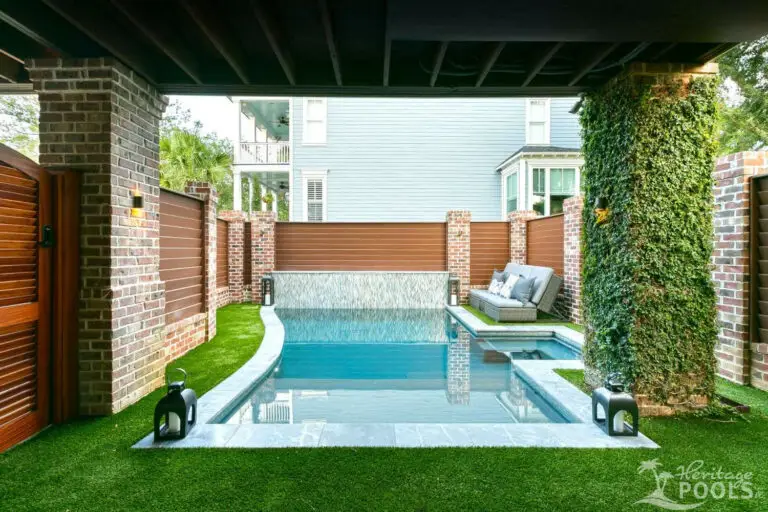When winter weather sets in, pools all over South Carolina close up for a few months. However, these pools don’t miraculously open back up come spring or summer; homeowners need to maintain their pools throughout the winter if they want to keep them healthy.
Even those familiar with typical summer pool maintenance might be unsure of how to proceed with winter pool maintenance. And that’s fair — while some tasks overlap, there are many winter-specific details you might not know about.
Whether you’re a new pool owner who wants to keep your beautiful investment pristine or a veteran pool owner who needs a refresher, discover these ten tips that come directly from the pool professionals here at Heritage. This advice will help you keep your pool healthy all winter long.
In This Article
- Why Winter Pool Maintenance Is Important
- Use a Pool Cover
- Check the Water Chemistry
- Keep Up With Pool Cleaning
- Adjust According to the Weather
- Open Your Pool Earlier Than You Think
- Add Algaecide Midway Through the Winter
- Monitor Water Levels
- Check the Pool Equipment Often
- Store Pool Accessories in a Safe Place
- Time the Pool’s Closing Correctly
- Top Maintenance Tips From Luxury Pool Professionals
Why Winter Pool Maintenance Is Important
It’s natural to wave aside the need for winter maintenance in a place like South Carolina; the state is often blessed with relatively warm weather, sometimes even in the dead of winter.
But winter pool maintenance is insurance for times when the weather is much less agreeable, when the forecasts call for temperatures dipping below freezing. Ignoring maintenance in winter and assuming everything will turn out well will likely have you rushing to fix an issue before a storm hits, and it will also make life more difficult when warm weather returns.
Winterizing your pool is an essential part of caring for it. Without winter maintenance, your pool could be subject to:
- Issues with the water’s cleanliness
- Damage to equipment that can be expensive to replace
- Damage to the pool itself from potential freezing
- A longer, more involved reopening, reducing the days you can use it
While maintaining your pool is a year-round endeavor, it’s a lot more straightforward than you might think. It’s even better when you hire a maintenance company to handle these tasks. That way you’ll have peace of mind knowing your pool is being cared for by professionals and those that have done this many times over.
Here are some tasks that we, as pool maintenance professionals, say are crucial for your pool going into a South Carolina winter.
Use a Pool Cover
Pool covers are necessary in summer since they’re instrumental in keeping debris, animals, or anything unwanted out of your pool. But it’s especially crucial to cover your pool in winter. You won’t be checking in on it nearly as often, so it’s easy for things to get into your pool without you noticing.
What makes a good pool cover? First, it should have no rips or tears. Tearing means that something could still enter your pool even when it’s covered.
Second, it helps to have a pool cover that’s either heated or has good insulation. Insulating your pool properly will help keep the water level stable and lower the chances of pool damage from freezing temperatures.
Another tip for caring for your pool cover is to ensure it stays dry. Moisture on your cover could potentially freeze if the temperature drops low enough. It’s not necessarily an issue during the winter, but once it thaws, the water will melt and eventually make its way into your pool.
Check the Water Chemistry
Even if you aren’t using your pool regularly, it’s vital that you check on the water chemistry weekly. Leaving your pool’s chemistry unchecked could cause a host of problems when it comes time to reopen. Chemistry is vitally important during cold weather as the chemicals are less active in colder water.
A well-balanced pool chemistry fights back against algae and bacteria. And since the temps can fluctuate between hot and cold in the Carolinas, pools can often become a breeding ground for these microorganisms. The chemicals also keep your water fresh and clear, which is what you’ll want to see when you’re ready to reopen.
Another reason to focus on water chemistry is that the water in many pools becomes more corrosive during winter. You may need to add more calcium to counteract this. Otherwise, the corrosion can affect your pool and the equipment.
Test and adjust your water regularly, and you should have no trouble with your water chemistry this winter!
Keep Up With Pool Cleaning
Your pool might not see much use over the coming months, but keeping the water as clean as possible is still a significant part of your maintenance routine.
If you go the entire winter without cleaning your pool, you’ll likely be playing catch-up when you’re finally ready to reopen. But this is about more than just having clean water. It’s also about ensuring that no debris floating around could impact the pool’s chemistry.
Leaves and other organic materials can be vessels for algae and bacteria. Should they find their way in, they’ll multiply and make for a frustrating cleanup. If you have a quality cover, this is less likely to be an issue, but it’s still something to watch for.
You can use robotic pool cleaners that scour the sides of your pool for debris, keeping everything clean with minimal effort. Additionally, while you might opt for professional cleaning more frequently when your pool sees a lot of use, scheduling a cleaning in the winter can be an excellent way to make sure your pool is as clean as possible.
Adjust According to the Weather
Charleston is often spared deep freezes, but it’s not uncommon for snow storms or frigid temps to find their way this far south. And when they do, it could spell trouble for your pool’s health.
Exceedingly cold temperatures, at or under 32 degrees, can cause your pipes to freeze, your lining to expand and contract, and your expensive pool equipment to crack. If you know a freeze is coming and you’ve been neglecting your pool maintenance, this is your chance to spring into action and give it some attention to ensure your pool doesn’t suffer any lasting damage. If forecasts call for freezing temperatures, make sure the pool is running full time. All pumps that have water in them should be on ass moving water can’t freeze.
If you didn’t have enough notice to mitigate potential damage, there’s still hope, but you’ll likely see some damage to your pool or equipment. You can do your best to insulate your pipes if you know freezing weather is coming. Otherwise, your best bet is to call for professional assistance and see what the pool experts can salvage.
Open Your Pool Earlier Than You Think

You likely wait until the perfect swimming temperature to open your pool back up for the season. But there are a few reasons you’d benefit from preparing your pool for swimming weather sooner than you might imagine.
Maintaining your pool’s clean water becomes more of a struggle the warmer it gets. This problem increases tenfold if you leave the cover on. The warm temps underneath the cover become a petri dish for unwanted organisms.
Charleston’s weather often makes a significant upswing quickly, so preparing to open your pool on the early side means you and your family will have more time for swimming. It’s not exactly a maintenance tip, but using your pool more frequently will likely lead to you giving it more care and attention.
Add Algaecide Midway Through the Winter
Algaecide is an excellent deterrent against algae growth. Algae can discolor your water into an unpleasant yellow or green color. But even worse, algae can harbor bacteria that make you sick. And while you can vacuum the pool or use a shock treatment to rectify large amounts of algae in a pool, this isn’t as simple to do during the winter.
Before adding the algaecide, make sure the pool’s pH is balanced and you’re using the correct dosage. You’ll also see better results if you brush the pool tile first. Any algae latching onto the pool lining will dislodge, making it easier for the algaecide to eliminate as much contamination as possible.
Add the algaecide to multiple parts of the pool, too. This way, the chemicals are more evenly distributed and address all the water rather than just one area.
If you aren’t already doing so, make sure you add algaecide when you open and close your pool for the season. The dose midway through winter is mostly for insurance.
Monitor Water Levels

Even if you have a high-quality pool cover, you should still look at your pool’s water levels from time to time. Pull back the cover slightly and record the water level: is it lower than the last time you checked?
If the amount seems off, you can adjust by either siphoning the excess water or adding water to rebalance the levels. For any one filling pools by hose, make sure hose bibs are disconnected. It’s also recommended to test levels after you do either to ensure the chemicals are still balanced.
Pools often see lower water levels in winter thanks to less humidity in the air. This is often less of an issue in a place like South Carolina. Regardless, a water level that is too high or too low is usually a sign that something is wrong, so it’s worth investigating to find the cause.
An important note: you never want to drain your pool fully in the winter. The cold air can be disastrous for your pool liner, and then you’ll have a much bigger problem on your hands.
Check the Pool Equipment Often
Your pool equipment is the only reason the pool is safe and swimmable, so it’s important to ensure the equipment’s safety during harsh winters. Take a moment to examine each component for any cracks or damage.
Taking pre-winter steps to ensure your equipment stays healthy is also prudent. This includes checking for excess moisture within the components. The cold air could freeze the water, causing the components to crack and potentially malfunction.
It’s smart to consider pool inspections or maintenance over winter as well. A professional’s keen eye can help, especially if you aren’t familiar with the equipment.
Store Pool Accessories in a Safe Place
If you disconnect any pool accessories, it’s best to store them in a location where they won’t be damaged. Have a designated area where you can easily see and properly organize each accessory.
Other items, like ladders or chemicals, also need proper storage even though they aren’t nearly as costly to replace. Chemicals should have storage instructions on the containers; follow these to ensure they will work as intended.
Time the Pool’s Closing Correctly
Much of winter maintenance can be frontloaded long before the temperatures drop, and these initial tasks are among the most important. Closing down your pool is typically an involved endeavor, but hiring a pool maintenance professional simplifies it.
Should you choose to tackle some of the tasks yourself, among the most important is getting the pool chemistry right before you put the cover on for the season. Any missteps with the pool’s chemistry at the beginning of winter might be challenging to undo by the time you notice them. However, this is much less likely if you’re testing your pool regularly, as advised.
It’s also good to know the ideal time to close your pool; typically, the pool can remain open as long as you can keep the water moving and the temperature doesn’t drop below 32 degrees. If either of these scenarios isn’t attainable, closing down for the season is wise to prevent any issues.
If you missed any of these tasks when you closed your pool, don’t worry — Charleston is warm enough that you might still have the opportunity to adjust. In this instance, we also recommend calling in a professional. They’ll know how to course correct and get your pool back in good shape for the remaining winter months.
Top Maintenance Tips From Luxury Pool Professionals
Taking care of your luxury pool can be remarkably simple if you follow a basic maintenance plan. Those who have chosen Heritage Pools feel confident that their beautiful pool is well-made to withstand the elements.
Our maintenance professionals can assist you with any of the tasks discussed in this article. We encourage you to reach out to us this winter if there’s anything your pool needs.Are you interested in learning more about building a custom pool for your home or servicing your current one? Contact Heritage Pools today to learn more about our process and services.
Download PDF



